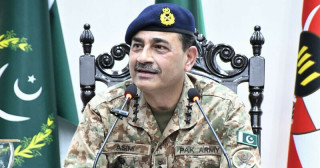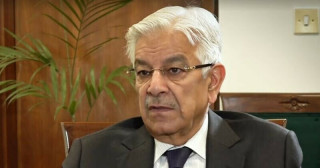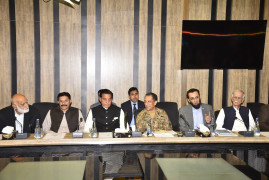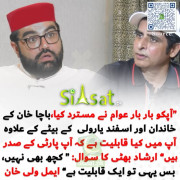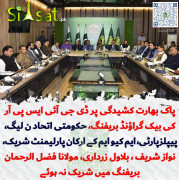
Jinnah the liberal
Jinnah, as it comes out, was a liberal to his bones. Why, he dressed up in sleek, hip western suits, drove imported cars, conversed in a foreign language and never sported a beard. In fact, the founder of this Islamic country doesnt share one common trait with the custodians of Islam we have in our country today. During the Independence Movement, members of the extreme right often looked down upon Jinnah, blatantly denouncing him to be an infidel and went on to the extent of tagging him Kaafir-e-Azam. Interestingly, after the birth of the same country even the mention of which they abhorred, they munificently assembled to define and devise the Islamic character of this state. No wonder our country is messed up!
Countries take time to develop their own cultures, an exclusive set of beliefs and traditions peculiar to them. Pakistan, just years above the golden jubilee landmark, is relatively a young country. It is only now that the impressions of colonialism have started fading. The clouds still hovering as a result of subservience to the British have started to disperse, but only to give way to more troubling vistas: the appalling picture of an excessively intolerant, fanatic society overwhelming with self-righteous monkeys. Based on religiosity, its either my way or no way in Pakistan.
Iskander Mirza once asked the Quaid, Sir, we all agreed to go to Pakistan, but what kind of polity are you going to have? Are you going to have an Islamic state? The Quaid replied, Non-sense! Im going to have a modern state.
It doesnt take much to realise that theres no accordance between the Quaids quote and the current scenario. For much we see in our country today are oppression, tyranny and compulsion, all adorned with the prefix of religious. In a country intended to be abreast the modern trends, all predicaments seem to be emanating from religion.
Religion can save us
Lest I be endowed with a handful of fatwas, I want to clear the air here about myself being an atheist; nor am I a sworn member of some ancient, secret brotherhood inclined to curb all religions. As far as my personal discretion goes, I firmly believe that Islam, and only Islam in its true essence, can take this country forward.
The implementation of Islamic principles of social justice and fairplay is precisely what the country demands at this moment. Yet, in the years that have passed, we have never taken any inspiration from Islams ethical teachings. Instead of being taken as a source of enlightenment, Islam in this country has invariably been used to impress a state of fear, to bag some votes, or to black-mail emotionally; religion always hits the soft spot, after all. The Islam we see in our country today is in direct contrast to the spirit of one of the most beautiful religions of this world. Theres no point in clinging to this barbaric version of religion. It damages, harms and little else.
Is Pakistan an Islamic country?
In terms of numerology, it definitely is; with about 97 per cent of the population comprising Muslims. But measuring the same on a scale of religious ideology doesnt yield very bright results. Despite being furiously proud of our religious identity, and flocking wildly to the mosques every Friday, we still have domestic violence in over 80 per cent of our households.
The birth of a baby girl is still a matter of shame than bliss for most of us; women are brazenly denied their basic rights in many parts of the country. Gay clubs are rapidly blossoming in our metros. Child molestation and abuse are spreading like wild-fire. Adultery, pre-marital sex and sexual offences are on an incessant rise. Every year, we break all past records of corruption. All the quintessential un-Islamic practices like stealing, robbing, rambling, drinking, lying, abusing, fighting and so on, are on an all-time high. Despite living in a vocally livid Islamic nation, if this is what weve been able to extract out of our religion, then something is severely wrong with our way of preaching. Had we been properly cognizant with the teachings of our religion, we surely wouldnt be so un-Islamic.
We the hypocrites
In a country created for the believers of a religion that teaches tolerance and mutual respect above all things, hypocrisy and force enjoy supremacy. We surely hit the roads the instant we ear the news of Quran burning in California, but ourselves are continuously coercing the Kalash people to convert. We may remain religiously glued to our television screens for all those inhuman, excruciating Indian soaps, but well never tolerate a Hindu bowing before his god in public in this country. If we cant allow others to practice their norms, we absolutely have no right to protest if France bans burqa in its territory. Weve learned to determine the piety of a man by the length of his facial hair, his nobility by the time he squanders on the prayer-mat. This is what weve come down to. In the name of religion, we have forgotten the actual deeds and insist on judging on the superficialities.
Coming towards the conclusion, religion hasnt done but exacerbated the situation in this country. And unless we learn and spread the true version of religion, itll keep on doing so. In the meanwhile, we must untie religion from other affairs in this country, as it has always served as a dangerous tool for ulterior motives.
Instead of scaring the masses of the hell-fire in case of transgression, we should impart them education and edification patiently and logically. For this we must bring to light actual religious scholars, who have, by the virtue of their knowledge, the ability to convince and inspire. More importantly, as in done in Malaysia, the sermons that our clerics declare on TV, in mosques, in congregations and so on, must first be approved by some religious authority.
For what Ive been through, our clergies keep on igniting the fire of hatred and contempt in their speeches. No one should be allowed to twist and mold religion for personal gains. Every body should be given the right to live life on his own. Each citizen of this country should be given the access to both: a mosque and a bar; and it depends on his personal choice to go either to pray or to liquor.
For Pakistan to serve its purpose of creation, we need to develop a nation where the masses refrain from bad, not due to the fear of some worldly punishments, but for the love of good.









